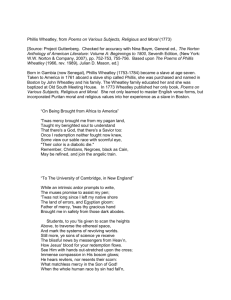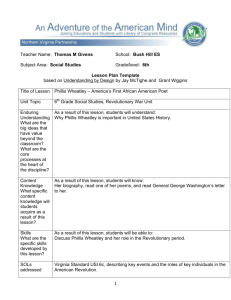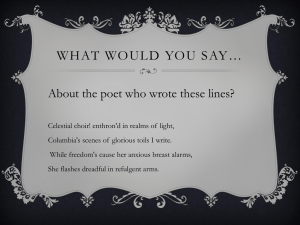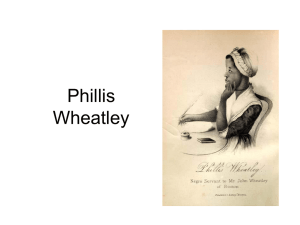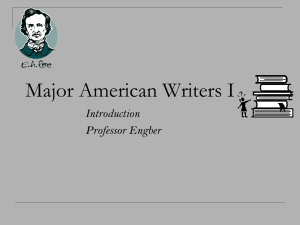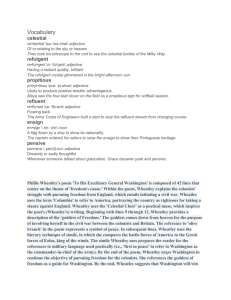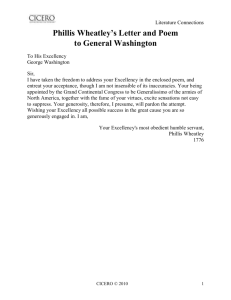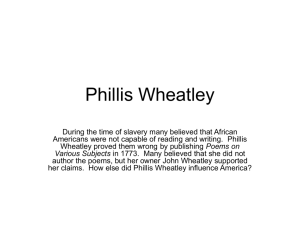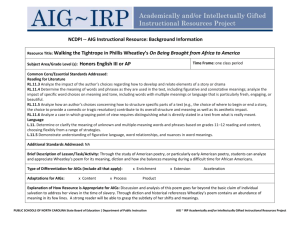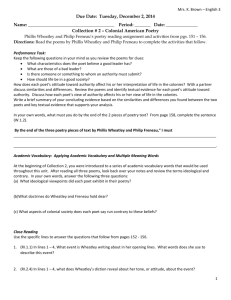phillis wheatley - English10 Period 5 BrookstoneSchool
advertisement
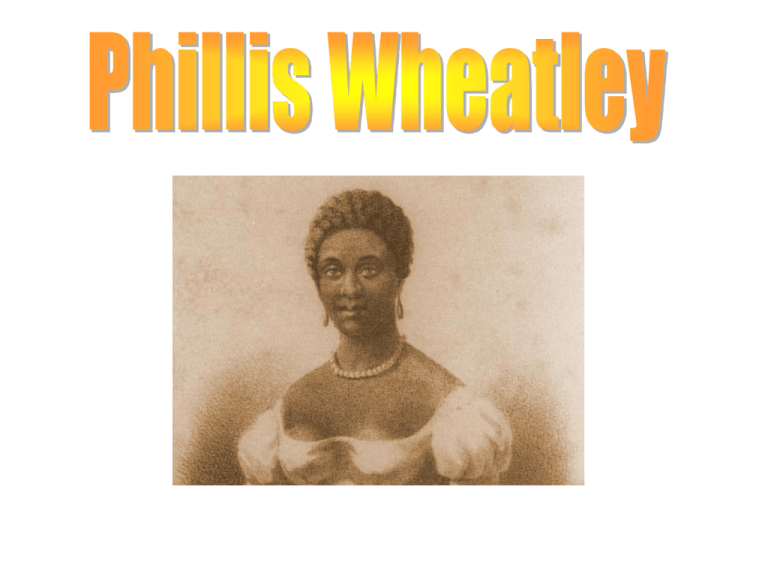
•1753-1784 •Born in Africa and Died in Boston, Massachusetts •Was sold into slavery at age 7 to John and Susanna Wheatley in Boston in 1761 •Her first name was derived from the ship that her to America, The Phillis •Originally brought into the Wheatley family as a servant and attendant to Wheatley’s wife but was soon accepted as a member of the family •She was raised with the Wheatley’s other two children •The Wheatley family taught her English and Christianity •Latin, Greek, ancient history, mythology, and classical literature •She began reading and writing a lot •At age 13 she wrote her first poem •Wrote this on the death of the evangelical preacher George Whitefield in 1770 •This brought a lot of attention to her and this included visits by a number Boston’s notables, including political figures and poets •In 1773, 39 of her poems were published in London as “Poems on Various Subjects, Religious and Moral.” •Most of her poems reflect her religious and classical New England upbringing •Wrote in heroic couplets and most stress the theme of Christian salvation •In 1767 the Newport Mercury published her first poem •The collection of poems were followed by a trip that she took to England •She was sent there for her heath when the Wheatley’s son was sent to England on business •Phillis had to return unexpectedly to America when they found out that Mrs. Wheatley was ill, who ended up dying the next spring •The American Revolution intervened in Phillis’ career and the effect was not all positive •The people of Boston, America, and England bought books on other topics rather than the volume of her poems •After this was just a series of unfortunate events •First, her master moved the household to Rhode Island then back to Boston, and when her master died in 1778 she was effectively if not legally freed. •Later, Mary Wheatley, died the same year and a months after the death of John Wheatley, Phillis married John Peters, a free black man of Boston, 3 children •The Revolutionary War continued its disruption and the couple briefly moved to Wilmington, Massachusetts. •Because of all of this chaos she was not able to publish a lot of poems during this time period but a few of her poems were published as pamphlets •Eventually John deserted her and to support herself she had to work as a maid in a boardinghouse until she died then child •In 1776, she wrote a poem to George Washington, proclaiming his appointment as commander of the Continental Army •After her marriage, she addressed several other poems to George Washington •She would send them to him but he would never respond to them •Her last known poem was written for him On Being Brought From Africa To America 'Twas mercy brought me from my pagan land, Taught my beknighted soul to understand That there's a God, that there's a Savior too: Once I redemption neither sought nor knew. Some view our sable race with scornful eye, "Their color is a diabolic dye." Remember Christians; Negroes, black as Cain, May be refin'd, and join th' angelic train. ----Phillis Wheatley •This poem is one allusion of injustice •Wrote this in regards on being brought to America through the Middle Passage •Full of verbal irony •When writing this she is being mindful that her audience is predominantly white Christians •She is expressing her anger that she feels toward the people who dragged her from her home To His Excellency General Washington Celestial choir! enthron’d in realms of light, Columbia’s scenes of glorious toils I write. While freedom’s cause her anxious breast alarms, She flashes dreadful in refulgent arms. See mother earth her offspring’s fate bemoan, And nations gaze at scenes before unknown! See the bright beams of heaven’s revolving light Involved in sorrows and veil of night! The goddess comes, she moves divinely fair, Olive and laurel bind her golden hair: Wherever shines this native of the skies, Unnumber’d charms and recent graces rise. Line 1 Celestial choir is the poet’s muse, a device of neoclassicism. The muse is called on to inspire the poet’s writing. Line 2 “Columbia” was a term Wheatley used for America, later used by other writers. Line 3 “Freedom’s cause” is the central theme of the poem, the struggle of the colonists to be free from England, even if it meant going to war against the more powerful British. Line 4 In this context, “dreadful” means “inspiring awe or reverence,” “in refulgent arms” means “in brilliant defense.” In this sense, Columbia (America) is portrayed in righteous terms for standing up against England. Lines 5–6 The speaker of the poem points out that other countries are watching something unique occurring in the uprising. And as it turns out, the American Revolution directly inspired the French Revolution. Lines 7–8 Heaven is affected by the struggle in a sorrowful way. Lines 9–12 The poet describes the goddess of Freedom coming down from the heavens to become involved in the war. Accomplishments • First African American to publish a book • An accomplished African American woman of letters • First African American woman to earn a living from her writing • First woman writer encouraged and financed by a group of women (Mrs. Wheatley, Mary Wheatly, and Selina Hastings.)
